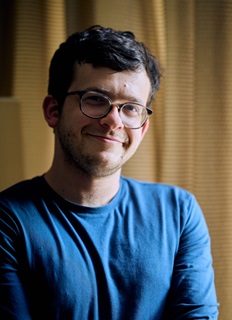Mr Michael Rizq, Peterhouse
mr810@cam.ac.uk

Biographical Information
I studied English and French at St John’s College, Oxford, then went to Trinity College, Cambridge, for an MPhil and a PhD in English. My work focuses on relationship between poetry and forms of knowledge, especially in the field of philosophy, from the Romantics to the present day. How do poets ‘think’ (philosophically or otherwise) with and through their writing? What kind of ethical and epistemic claims arise in the distinctive form of verse?
I am currently working on a monograph, provisionally entitled Form's Philosophy, based on my PhD thesis. It focuses on four Anglo-American poets – Emily Dickinson, Gerard Manley Hopkins, T.S. Eliot, and Geoffrey Hill – who were especially interested in the vexed question of the moral and spiritual ‘value’ of poetry, and explored this through the medium of verse itself. Drawing on a wide range of their influences, from Samuel Taylor Coleridge to Gillian Rose, I explore how their work complicates traditional moralistic or doctrinal arguments, as well as blind ‘defences’ of poetry per se. What their poetics can show us, I argue, is a more sophisticated mode of moral thinking grounded in the weird operations of sounds, words, lines, and stanzas: one full of uncertainty, slipperiness, and self-critique.
I’m also beginning to work on a new (and fledgling!) project about modernist poetics. I’ve recently become interested in a series of loosely connected poets and critics – Emily Dickinson, Stéphane Mallarmé, Gertrude Stein, William Empson, John Ashbery, Hill again, J.H. Prynne, and Joan Retallack – who have written about the cognitive difficulties associated with verse-form: words such as ‘perplexity’, ‘obduracy’, ‘complexity’, and ‘scepticism’ often come up in their work. Why did these features prove so provocative for them? What might we, as readers of poetry, stand to gain from such vertiginous experiences?
At Cambridge, I have taught widely a range of papers (‘1660–1870’, ‘1830–1945’, ‘1847–72’, ‘Lyric’, ‘The Ethical Imagination’, and ‘Practical Criticism and Critical Practice’), and supervised dissertations on Victorian and modernist poetry. I am always keen to hear from students or academics interested in modern poetry, philosophical poetics, the connections between literature and ethics, or any other related questions.
Research Interests
Literature and ethics; poetic form; philosophical poetics; aesthetics and cognition; difficulty; literature and religion; Victorian poetry; modernist poetry; literary criticism and critical practice.
Selected Publications
Journal articles
‘T.S. Eliot, poetry, and the ethics of “feeling”’, ELH: English Literary History, 91.2 (Summer 2024), 501-31.
‘“Bidding and forbidding”: Morality, prosody, and The Wreck of the Deutschland’, The Review of English Studies, 73 (November 2022), 954-70.
‘Fact, rhythm, and resistance in The Ring and the Book’, Victorian Poetry, 59.4 (Winter 2021), 391-410.
‘Tinnitus aurium: Hearing Hill’s Eliot’, The Cambridge Quarterly, 48.2 (Summer 2019), 133-50.
‘“It is not enough that we should read Wordsworth”: Estranged Recognition in Four Quartets’, Philological Quarterly, 97.3 (Summer 2018), 333-57.
Other publications
‘Machine without end’, review essay about Ryan Ruby, Context Collapse: A Poem Containing a History of Poetry (Seven Stories Press, 2024), forthcoming in Still Point.
‘Exemplary reading?’, review essay about Bridget Vincent, Moral Authority in Seamus Heaney and Geoffrey Hill (Oxford University Press, 2022), The Cambridge Quarterly, 52.1 (Spring 2023), 86-92.
Review of Martin Lockerd, Decadent Catholicism and the Making of Modernism (Bloomsbury Academic, 2020), Time Present: The Newsletter of the International T.S. Eliot Society, 104 (Summer 2021), 5-6.
‘Eliot, Leavis, Larkin: Permanence and its problems’, 2018 Matthew Arnold Memorial Prize-winning essay, Faculty of English, University of Oxford.
Conference papers
‘Hopkins, straining’, Hopkins Society UK Conference, Stonyhurst, Lancashire, 27 October 2024 (as invitee).
‘Geoffrey Hill and Critical Perplexity’, Critical Forms: New Approaches to the Study of Literary Form (graduate research forum), University of Cambridge, 11 June 2024.
‘Reading, feeling, knowing?’, Gerard Manley Hopkins International Literary Festival, Newbridge, Co. Kildare, 24 July 2023 (as invitee).
‘Geoffrey Hill and Critical Perplexity’, The Functions of Criticism, University of Cambridge, 20 May 2023 (as co-organiser).
‘Gerard Manley Hopkins and the “tremble” of poetry’, Nineteenth Century Seminar, Faculty of English, University of Cambridge, 2 May 2023 (as invitee).
‘T.S. Eliot, F.H. Bradley, and “feeling”’, What Does The Poem Think? Aesthetics, Poetics, and Thought, University of Cambridge, 8 April 2022.
‘Eliot’s “thrill”: Moral apprehension from F.H. Bradley to Marina’, International T.S. Eliot Society Annual Meeting, 25 September 2021.
‘Gerard Manley Hopkins and poetry’s “bidding”’, English Faculty Flash Forum, University of Cambridge, 18 June 2021.

